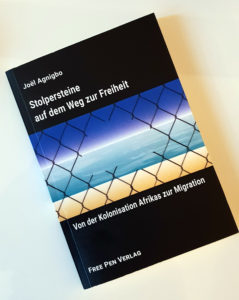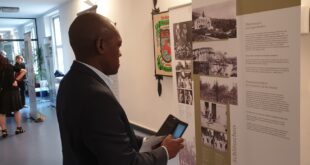As I write this article, 49 migrants, mostly Africans, are stranded at sea. They had been rescued in the Mediterranean by the humanitarian organisation Sea Watch about two weeks ago but no European country is ready to allow the migrants to disembark at its port.
Last year, about 112,000 migrants found their way irregularly through the Mediterranean to Europe while at least 2,217 lost their lives in the process, according to the International Organisation for Migration. Many more are even believed by migration experts to have died in transit; travelling across the Sahara Desert, for example. Hundreds of thousands of migrants, mostly from sub-Saharan Africa, are stranded in Libya not being able to continue their journey to Europe. There is a crisis.
In his book Stolpersteine auf dem Weg zur Freiheit – Von der Kolonisation Afrikas zur Migration (“Stumbling Blocks on the Road to Freedom – From the colonization of Africa to migration”), Joël Agnigbo shows methodologically how the vestiges of Africa’s colonial experience are in various ways responsible for today’s migration from the continent to Europe.
The author, a graduate of cultural and political history at the University of Siegen, Germany, who is originally from Togo, criticises the education system in Africa because it’s not attuned to the culture, reality and needs of the people. A system that gives the impression that all that is good has to be foreign. The lack of local relevance is the reason that most school leavers and graduates are not employable, Agnigbo opines.

ISBN 978-3-945177-64-8
€ 12,-
He therefore calls for a radical reform of the education system which the Europeans originally set up mainly for the purpose of training local helpers in the machinery of colonial administration.
Agnigbo also identifies the looting of African resources by Western companies in collusion with the continent’s ruling elite and the unfair trade relations between Africa and the world as contributory factors to migration.
Moreover, Agnigbo blames the negative image of Africa in the West and a romanticised view of the West in Africa as a driving force for migration as young folks in Africa sometimes do leave their homelands not because there is absolutely no opportunities but the idealised image of the outside world which makes them believe that they only need to travel out to achieve their dreams.
On his motivation to write the book, Agnigbo said: “I wanted to get to the bottom of relations between Africa and Europe myself. That’s why I studied cultural and political history. During my studies, I learned that cultures are the link between societies. Every society has a way of thinking, feeling and acting. That was a great realization for me. From this I concluded that the complete destabilization of African cultures by Europeans during colonization had enormous consequences.”
Stolpersteine auf dem Weg zur Freiheit is very original in its analysis and should be read not only because of its explanations of the roots of the ongoing migration from Africa but also because of its relevance to understanding why the continent hasn’t been able to make as much progress as its peoples desire.
Femi Awoniyi
 THE AFRICAN COURIER. Reporting Africa and its Diaspora! The African Courier is an international magazine published in Germany to report on Africa and the Diaspora African experience. The first issue of the bimonthly magazine appeared on the newsstands on 15 February 1998. The African Courier is a communication forum for European-African political, economic and cultural exchanges, and a voice for Africa in Europe.
THE AFRICAN COURIER. Reporting Africa and its Diaspora! The African Courier is an international magazine published in Germany to report on Africa and the Diaspora African experience. The first issue of the bimonthly magazine appeared on the newsstands on 15 February 1998. The African Courier is a communication forum for European-African political, economic and cultural exchanges, and a voice for Africa in Europe.

































